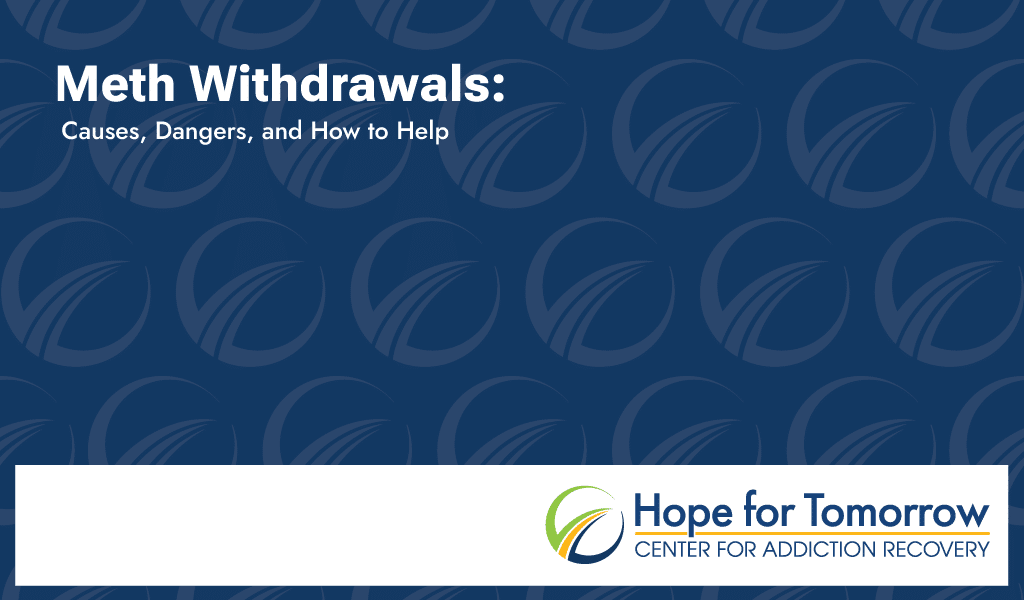

Imagine: you’re exhausted, but your sleep is restless. When you wake up, you wish you didn’t, because it’s like joy doesn’t exist anymore. You don’t want to do anything. When you manage to gather the energy to try something, it’s pointless – even what you used to love the most doesn’t make you feel anything anymore. It’s like you’re empty. You know what could fill that space, though. You know what could fix it so easily, and in the end, it feels impossible to resist meth’s pull. It doesn’t matter if it’s hurting your body. It doesn’t matter if it’s hurting your relationships. All that matters is the relief it provides for now.
It’s painful, isn’t it? If you’re here because someone you love is experiencing meth withdrawals, that’s a glimpse of the vicious cycle they’re caught in. 87%-97% of people who chronically seek out meth experience it, and it’s one of many reasons why empathy is paramount. They are in a deep amount of pain, even if they don’t realize it, and they need your support.
You might be reading this, and don’t have to imagine what comes with meth withdrawal, because you’ve experienced it yourself. If that’s the case, we’re glad you’re here. You’ve already taken an important step to reduce meth’s power.
The emotional and physical pain that comes with meth withdrawal is a major component of the cycle of meth addiction. At Hope for Tomorrow, we believe understanding something is a stepping stone on the way to overcoming it. Meth withdrawal is certainly a hefty obstacle for anyone with a meth use disorder. Let’s learn more about it today, and make tackling it feel a little more possible.
Meth withdrawal is all of the unpleasant symptoms that appear when you go a while without taking meth. It’s the physical and psychological result of your brain and body adjusting to a life without methamphetamine in your system after it gets used to it being there often.
To fully understand how withdrawal works, you have to understand how meth impacts your brain.
A healthy brain releases a neurotransmitter – a chemical messenger in your brain – called dopamine whenever something makes you happy. It’s often called the “pleasure neurotransmitter” for this reason. When your excitement and happiness fade, your body recycles the dopamine so it can use it again the next time you have a good experience.
When you introduce meth into the equation, that entire system gets disrupted. Meth not only causes massive amounts of dopamine to release in your brain when you take it – it also interferes with that recycling process. Eventually, your brain adjusts to the meth in your system and starts relying on it to feel pleasure.
That means when you don’t take meth, your brain gets a little lost without it. It doesn’t know how to produce dopamine properly on its own anymore, so you experience depression, low mood, and emotional numbness. The uncomfortable physical symptoms of withdrawal also appear as your brain and body try to adjust to life without meth.
Your body relying on meth to function properly is called a physical dependence. That’s not the same as an addiction to meth, but they often go hand in hand. Addiction has a vital psychological component, where you feel like you can’t function without meth emotionally, either, and you’ll do whatever it takes to get another dose. Because a meth addiction requires repeated meth use, people who have a meth use disorder almost always experience withdrawal.

For as horrible as meth withdrawal symptoms feel, they are rarely physically dangerous. The biggest physical risk is dehydration, which can happen easily if you’re caught up in painful symptoms. As long as you remember to drink plenty of fluids, physically, you should be okay.
The biggest danger of meth withdrawal is the psychological symptoms that come along with it. The depression and emptiness that is commonly part of meth withdrawal puts people at risk of self-harm, and in some cases, suicide. Suicide is thought to be the cause of 18% of meth-related deaths, making it a significant concern.
As your body adjusts to the lack of meth during withdrawal, your ability to tolerate meth also goes down. That means if you return to meth after stopping for a while, your body might not be able to handle the dose of meth you were taking originally. This increases the chance of a meth overdose.
Meth withdrawal comes with many unpleasant symptoms, ranging from mild to severe. How severe they are depends on multiple factors, including your general health, body composition, and meth habits. It’s important to note that while these symptoms are common with meth withdrawal, some people may have additional symptoms. There’s no exact equation, and everyone is different.
The psychological symptoms of meth withdrawal are generally the worst part of it. Psychological symptoms can be debilitating, and in some cases, life-threatening. These include:
While physical symptoms are less prominent than psychological symptoms, they’re still unpleasant. Some to look out for are:
The timeline of meth withdrawal varies from person to person. Just like the severity of symptoms, many factors influence the timeline, including how much meth you’ve taken, how long you’ve taken it, and how often you take it. The chart below will give you a general idea of what to expect.
| Time Period | Symptoms Experienced | Details |
|---|---|---|
| 0-24 hours | Low mood, anxiety, irritability, fatigue, chills, insomnia, cravings | These symptoms can start within as little as a few hours after the last dose of meth, but it’s most common to take several hours. |
| 24-72 hours | Depression, suicidal thoughts, hallucinations, psychosis, difficulty concentrating, inability to feel pleasure, sleeping a lot, many symptoms from the first 24 hours | Not everyone will experience all of these symptoms, but if they surface, it will be during this time. The initial symptoms of meth withdrawal also usually get worse. |
| 72 hours-1 week | Cravings, depression, psychosis | While many other symptoms will improve during this time, depression, psychosis, and cravings can be at their worst. |
| 1-5 weeks | Cravings, potential depression, and lack of pleasure | By this time, symptoms aside from cravings are gone for most people, but it isn’t uncommon to experience lingering depression. |
| 5+ weeks | None for many people, but depression and other mild symptoms for some | If you experience symptoms for longer than a month, it’s considered “protracted withdrawal” or “post-acute withdrawal syndrome.” While always possible, not everyone will experience protracted withdrawal. Even if you do, symptoms won’t last forever and can be managed. |
While it’s possible to manage withdrawal at home, we highly recommend against doing it alone. Meth withdrawal is very rarely physically dangerous, but psychological symptoms can be intense and it’s best to have someone with you for support. It’s ideal to go to an addiction recovery center to heal and receive treatment, but if you can’t, surround yourself with people who love you and can help you. If there’s a risk of someone hurting themselves or others, get medical help right away.
If you go to an addiction recovery center for meth detox, you might receive over-the-counter medications or mental health medications to manage withdrawal symptoms, but there are currently no medications used to specifically treat meth withdrawal. That means medical detox for meth doesn’t really exist.
However, it’s still best to detox in the safety of an addiction recovery center, where experts can watch over you and help you through any difficult symptoms as meth leaves your system. They’ll also ensure you’re prepared for the next stages of your treatment and recovery, and give you the support you need to start off on the right foot.

It’s easy to get caught in the cycle of meth use and withdrawal. Even though you want to stop taking meth, withdrawal is excruciating, and meth feels like your only source of happiness. How do you break free from a pattern like that?
It isn’t easy, but it is possible. You don’t have to do it alone – and you shouldn’t! That makes it so much harder. Help and healing are available, and meth rehab is the place to start on your journey to recovery. You’ll work toward breaking that cycle alongside others with similar goals, and compassionate staff who are ready to do whatever it takes to help you overcome meth addiction.
Hope for Tomorrow is an addiction recovery center with locations in Point Pleasant and Beckley, West Virginia. We love what we do and hearing the stories of everyone who walks through our doors. Whether they’re a pregnant woman, a veteran, someone with additional medical complications, someone who came into treatment with their partner, or someone in between – we pride ourselves on providing a place where everyone has the chance to heal. That includes you and your loved one. Call us today at 877-679-8162 to learn more.
Treatment today for a brighter tomorrow.